EDUCATI N
The magazine of the Virginia Education Association
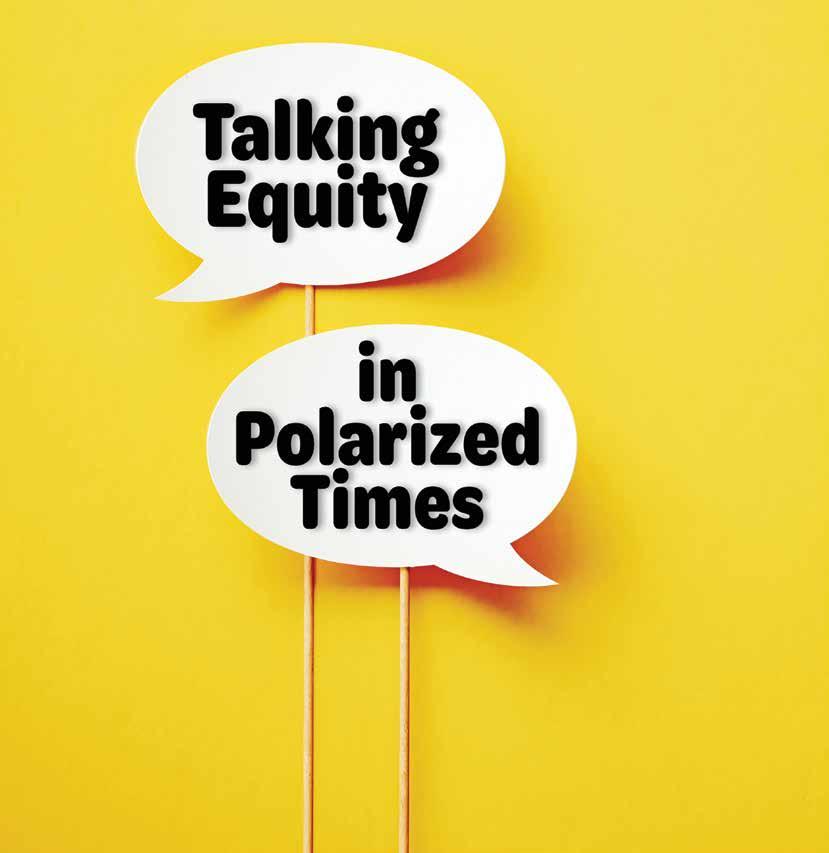
June 2024
JOURNAL of
VIRGINIA
8
Talking about equity in today’s polarized environment.

UPFRONT
4-7 This month: Fighting loneliness, taking a cautious approach to artificial intelligence, and March Madness.
FEATURES
13 Support the ESP Bill of Rights! Join a national movement to support our ESPs.
14 A Very Good Sign Cumberland County students preserve history by initiating the creation of historical roadside markers.
15 Pumping the Brakes VEA saved thousands of school bus driver jobs during the General Assembly.
16 Got Five Minutes? One former middle-schooler, now a writer and journalist, says it can be enough to save a life.
18 On the Road Again A Gloucester County teacher travels abroad with students after COVID.
DEPARTMENTS
20 Membership Matters Convention delegates elect new VEA leadership.
24 Insight on Instruction Four character-based ways to boost kids’ mental health.
30 First Person After 50 years, words to live by.

“Do I need a legal defense fund?”
Editor
Tom Allen
VEA President
Dr. James J. Fedderman
VEA Executive Director
Dr. Brenda Pike
Communications Director
Kevin J. Rogers
Graphic Designer Lisa Sale
Editorial Assistant/Advertising Representative
Kate O’Grady
Contributors
Hilary Falkenberg
Bruce Ingram
Xandra Harbet
Vol. 116, No.6
Copyright © 2024 by the Virginia Education Association
The Virginia Journal of Education (ISSN 0270-837X) is published six times a year (October, November, December, February, April and June) by the Virginia Education Association, 8001 Franklin Farms Drive, Suite 200, Richmond, VA 23229.
Non-member annual subscription rate: $10 ($15 outside the U.S. and Canada). Rights to reproduce any article or portion thereof may be granted upon request to the editor. Periodicals postage paid in Richmond, VA.
Postmaster: Send address changes to Virginia Journal of Education, 8001 Franklin Farms Drive, Suite 200, Richmond, VA 23229.
Article proposals, comments or questions may be sent to the editor at tallen@veanea.org or Tom Allen, 8001 Franklin Farms Drive, Suite 200, Richmond, VA 23229, 800-552-9554.
Member: State Education Association Communicators
VEA Vision:
A great public school for every child in the Commonwealth of Virginia.
VEA Mission:
The mission of the Virginia Education Association is to unite our members and local communities across the Commonwealth in fulfilling the promise of a high quality public education that successfully prepares every single student to realize his or her full potential. We believe this can be accomplished by advocating for students, education professionals, and support professionals.
COVER STORY
CONTENTS
Cover illustration by iStock


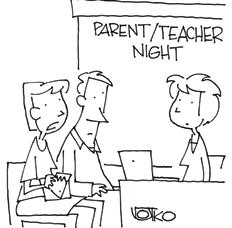
“We
AI: Proceed with Caution
From Time for a Pause: Without Effective Public Oversight, AI in Schools Will Do More Harm Than Good, a report by the National Education Policy Center:
Advocates for AI claim that it will transform teaching and learning for the better. This will not happen, however, if integrating AI into the pedagogy of schools degrades the relationship between teachers and students. It will not happen if the AI imposes a rigid mechanistic model of instruction, corrupts curriculum with misinformation, and biases consequential decisions about student performance. It will not happen if integrating AI into schools’ administrative processes locks schools and districts into an expensive “stack” of corporate tech systems for many of their everyday operations, with the result that funds available for other uses—including the teachers who can develop deep connections with the nation’s students—are increasingly shifted to corporate vendors. It will not happen if the AI exacerbates violations of student privacy, increases surveillance, and further reduces the transparency and accountability of educational decision-making.
All of these harms are likely if lawmakers and others do not step in with carefully considered regulations.
Writers of the report went on to make these recommendations for state and local decisionmakers:
State policymakers:
• Establish an independent government entity charged with ensuring the quality of digital educational products used in schools. Charge this entity with reviewing and approving the pedagogy and programming of any digital educational product a school proposes to use, both prior to implementation and periodically thereafter. Require that the programming of any digital educational product—explicitly including products that incorporate AI— used in schools be transparent and amenable to review.
• Create classroom contexts that allow teachers to spend more time with their students, such as enacting legislation to limit class size, so that teachers are not pressured to find ways to keep students quietly occupied with digital products.
District policymakers:
• Refrain from adopting AI-based educational applications until:
• Strict transparency and accountability requirements are put in place as part of an overall technology accountability plan.
• The public has been provided with compelling evidence or thoughtful and clear explanations as to how those applications are an improvement over other education practices that do not require digital technology.l
Say My Name
“My name is Miguel, but a lot of my teachers called me Michael. In seventh grade, I finally had the courage to tell my principal that I’d like to be called by the name my Latino parents gave me—Miguel, not Michael. To any student reading this, your identity matters.”l

— U.S. Secretary of Education Miguel Cardona, in a social media post
Progress is Slow…
While the solution to America’s teacher shortage is still a long way off, glimmers of hope may be starting to appear. According to the Center for Evaluation and Education Policy Analysis at Penn State University, teacher preparation program enrollment in the U.S. grew 12 percent from 2018 through 2022, which translates to more than 46,000 additional candidates.
Virginia’s enrollment, however, did not grow at the nation’s rate. The top nine states in teacher prep program growth were Arkansas, Delaware, Florida, Ohio, Louisiana, Maryland (which had the strongest growth), Pennsylvania, Ohio, Rhode Island, and South Carolina.
Our need for teachers is still a long way from being met, however: the report notes that the number of students enrolled in teacher prep programs in school year 2021-22 remains “substantially lower” than it was in 2008-09 nationwide and in most states.l

Second-Graders Ace March Madness
Some 23 million people submitted their brackets to ESPN for the 2024 NCAA men’s championship basketball tournament. Many had probably spent hours researching their choices, weighing scouting reports, reading the thoughts of television and other commentators and, sometimes, trusting their gut feelings. Oh, well.

They could have saved lots of time and effort by consulting an Apex, North Carolina class of second-graders. Making their selections game by game with a show of hands, the students finished fifth overall in the massive field.
Second-year teacher Matt Falcone, in an attempt to brace his 18 students for the realities of probability, told them that it would be impressive if they finished in the top 10 million because that would still be better than about half the country. Turns out they did considerably better.
The father of one of Falcone’s students, interviewed by a local television station, noted that his bracket had finished in 4-millionth place.l
Finding Their Own Way
“The value of an education lies in the struggle to get it. Do too much for people and they will do nothing for themselves."l
— American writer Elbert Hubbard

4 VIRGINIA JOURNAL OF EDUCATION | JUNE 2024 VIRGINIA JOURNAL OF EDUCATION JUNE 2024 5 UP FRONT
“I asked you to stop talking. It’s not a gag order.”
illustrations by iStock
Photos and
don’t understand. At home, our daughter has all the answers.”
Teachers in a nationally representative sample of 1,400 K-12 who reported restricting their own instruction on “political and social issues,” nearly double the percentage of American teachers who said they actually have state laws requiring discussionof issues like race, sex, and gender in the classroom.l
Source: Rand Corporation

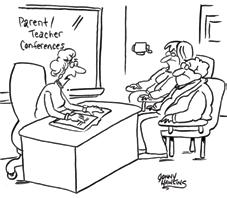
Step Away from the Phone, Mom and Dad

We all know that educators struggle to keep students off their cell phones in school. One of the best ways, though, to make headway in that struggle appears to be encouraging parents to stop texting their children at school. Here are some comments from teachers quoted in an Associated Press article headlined “Why You Should Stop Texting Your Kids at School”:
• “Think of it this way: ‘If you came to school and said, Can you pull my child out of calculus so I can tell them something not important? We would say no.”
• “We call it the digital umbilical cord. Parents can’t let go. And they need to.”
• “By texting back and forth with a parent, a child is unable to practice either self-calming or problem-solving skills. It’s easy to text, but if I don’t have a phone, I have to go ask the teacher or I have to figure it out on my own.”
• “When the phone vibrates in their pocket, now their focus is on their pocket. And they’re wondering, ‘How do I get it out to the table? How do I check it?’ “You ask them a question and they haven’t heard a word you’ve said. Their brain is elsewhere.”l
You Never Know How High They Might Go

“When I looked out the window, we were flying over North America. I could see Canada, the U.S., Mexico, and part of Central America, and you know what struck me in awe? I couldn’t tell where one country ended and the other began. I had to come out of this world to realize that down on Earth, we’re just one.”l
— Jose M. Hernández, former NASA astronaut and author of Reaching for the Stars: The Inspiring Story of a Migrant Farmworker Turned Astronaut, on his experience orbiting Earth. He credits his second grade teacher with changing his life, saying, “When I blasted off into space, she was there at my invitation, sitting next to my parents. Remember this story when feeling frustrated. Your work makes a difference, even the little things.”
Fighting Loneliness—Together
Recognizing what may be the underlying cause of our nation’s growing mental health challenges, U.S. Surgeon General Vivek Murthy issued the “Advisory on Our Epidemic of Loneliness and Isolation” last year and followed it up with a nationwide We are Made to Connect Tour.

“What young people tell me often is that they are struggling with a sense of loneliness and isolation,” he said in a recent interview, “that they feel like all of the burdens they’re contending with in their life, they’re dealing with alone.”
One of the practical results that grew from the advisory and tour is the Surgeon General’s 5-for-5 Connection Challenge, an exercise created during our time of massive social media use to help you build and strengthen your relationships and inspire others to incorporate more personal connection in daily life.
The premise is simple: Pick five actions for five days in a row to connect with people in your life. It can be a great classroom activity, and there’s even a toolkit available. Learn more at www.hhs.gov/surgeongeneral/priorities/connection/challenge/ index.html.l
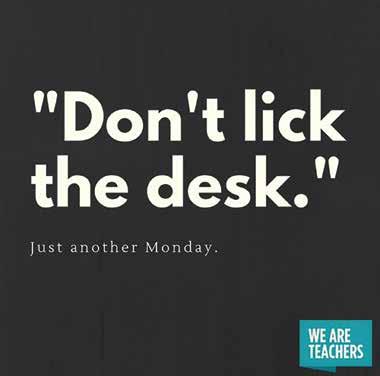

Painted Yellow, Riding Green?

As of December 2023, Virginia ranked fourth in the U.S. among states with electric school buses that are either in use or on order. The only states with more are California, Maryland, and New York. The Commonwealth’s total stands to grow shortly, too, as federal grant money from the Environmental Protection Agency will be used to add electric school buses in Fairfax County and Lynchburg. While all that may sound encouraging, and while the number of electric school buses, either on the road already or on order has more than tripled since 2021, electric vehicles still only make up close to 2 percent of Virginia school buses, and only about 1 percent of our country’s 480,000 school buses were electric at the end of 2023.l
Source: World Resources Institute, Public News Service
6 VIRGINIA JOURNAL OF EDUCATION | JUNE 2024 VIRGINIA JOURNAL OF EDUCATION | JUNE 2024 7 UP FRONT Photos and photo-illustration by iStock
“He has Attendance Deficit Disorder.”
“Pretty sneaky. First she talks us into reading The Scarlet Letter, then she tells us it’s a whole book.”
65%
Talking Equity in Polarized Times
Excerpt from forthcoming book shares stories and strategies from teachers and students.
By Kristien Zenkov, Lin Rudder, Jeff Keller, and Meagan Call-Cummings

It’s hard for me to explain to people who aren’t teachers how skilled I am at this, how much training I’ve had, and how I take this so seriously. They seem to think that because they went to high school, they know what’s going on, and they can weigh in and question me – not only for their child, but for all children. There is not that respect towards people in education.
—
Bobbi,
high school teacher
Let’s talk. No, really, let’s TALK: let’s be honest. Let’s talk about schools, let’s talk to teachers and young people about schools. And, better yet, let’s listen to teachers and young people about what’s working, what’s not, and what might work in today’s classrooms and school buildings. Such conversations are the focus of the upcoming book, Talking Equity in Polarized Times: Stories and Strategies from Teachers and Students, by Meagan Call-Cummings, Lin Rudder, Kristien Zenkov, and Jeff Keller (Virginia’s 2024 Teacher of the Year). The authors interviewed more than 30 teachers across the United States for their views on what it is like to teach during a time when political actors seem particularly interested in schools. Each of the chapters focuses on a different hot-button issue in education – including race and racism, immigration, diversity, and LGBTQIA+ advocacy. Structured as an oral history, the book centers real teachers’ stories, struggles, and reflections to arrive at one resounding conclusion: many things in our world have changed the last few years, but teachers continue to do their best to put students first, even when that proves difficult, and the best thing we can do for education right now is listen to teachers.
Contexts and Connections
Schools are institutions with which virtually all of us have considerable experience: schools and the practices of formal education may be the singular most unifying organizations and procedures we have as citizens and residents of the U.S. But because
schools are institutions filled with and focused on the young, they are just as vulnerable and subject to society’s whims as the demographic they serve. High school teacher Alfonso reminds families that we all theoretically want the same thing from our schools – to nurture, educate, and support children.
We are on the same team for your child. There are going to be times when you get an email that maybe you don’t like. But I just want you to know that it’s with their best interests in mind. Because in this classroom we have control over what happens, but later on, in college or at the workplace, they’re not going to get those training wheels.
But teachers are encountering more tensions between them, parents, and policymakers about how to best serve young people. A recent national study revealed that 65 percent of K-12 teachers in the U.S. say they limit instruction on political and social topics, driven by concerns over parental complaints and evolving legislation restricting discussions on history, race, sex and gender.
The “LGBTQIA+ Advocacy” chapter in Talking Equity in Polarized Times highlights teachers who are trying to serve their students while simultaneously navigating these tensions. The past few years have seen a rash of anti-LGBTQIA+ legislation and in Virginia, Governor Glenn Youngkin’s administration advanced “model” school board policies rolling back protections for transgender students throughout the Commonwealth. We would be remiss if we did not note that in the midst of writing this chapter, news broke nationally about the death of a nonbinary student, Nex Benedict, in Owassa,
Illustration by iStock VIRGINIA JOURNAL OF EDUCATION | JUNE 2024 9 8 VIRGINIA JOURNAL OF EDUCATION | JUNE 2024 COVER STORY
Oklahoma. At the time of our writing, the exact cause of Nex’s death remains under investigation. What is clear, however, is that Oklahoma’s newly adopted policy for bathroom use by transgender students forced Nex into a situation that resulted in bullying and in a physical altercation in a girl’s bathroom. It is not hyperbole to say that death.
ia, was frustrated having to comply with that law about “sexually explicit content” that offered little guidance but serious consequences: At the end of last school year, we were given information about our county’s adoption of a ban against books that include “sexually explicit content.” So, I was tasked with going through every book on our bookshelves looking for anything that might be considered “sexually explicit content”...I mean, if I’m going to be honest, it was an incredible waste of time. I was spending seven hours every day in our book room, using different resources to help me identify anything that might be considered sexually explicit.

Teacher Experiences
The 30 teachers interviewed for this book highlight again and again that every decision they make is in service of nurturing children in their care. Teachers’ own words in the chapters capture the themes of navigating restricted content, detrimental policies, and giving students a safe space. And students’ perspectives shared in the book highlight how these issues are rarely controversial for most youth.
Navigating Restricted Content
Amy, a high school teacher in Virgin-
Amy emphasized how one parent in her school consistently challenged curricula – resulting in intensive, expensive review processes – when all parents have always had the right to exempt their children from any lesson. The teachers we interviewed repeatedly highlighted that the main issue was when parents wanted to speak for all children, not simply their own. Amy added:
I think it demonstrates that there is a mindset that teachers should not be trusted as professionals – that teachers are indoctrinating students. I mean, so many teachers just care so deeply about their students, and to have anyone suggest that we don’t have the best interests of students in mind when we make these choices, it’s just insulting and hurtful. As a result of these laws and parental outcry, many teachers are also changing their instruction in order to protect themselves, including Sabrina, an elementary school teacher who
also identifies as a member of the LGBTQIA+ community: There’s this most amazing children’s book. It’s called And Tango Makes Three. It’s a true story about a penguin family at the Central Park Zoo. There were two male penguins that were together during every mating season, and the zookeeper noticed, and whenever the eggs were laid, and the penguin moms and dads would share the egg back and forth, these two penguins would use a rock. But then, one year, a penguin mom and dad gave birth to twins. So, I guess penguins don’t do well with twins, so they took one of the eggs and gave it to this male couple. They would do the back and forth thing, and they hatched this baby penguin named Tango, and they lived – silly as it is –happily ever after. But the thing is, I’m not reading that book in here. This does not mean Sabrina is ignoring the need for all of her students to be welcomed and affirmed. Instead, she is having to work harder to find ways around the controversy: So, I do feel restricted when it comes to sharing books. But try to work around it in other ways, to focus on books that talk about inclusivity, being proud of who you are and accepting who you are.
Detrimental Policies
Many teachers spoke about districts adopting policies that limited their ability to affirm students’ identities – including Heather, a science teacher: We have a policy that specifically says we are not allowed to ask students their pronouns. I’m really struggling with that right now. mean, all the research shows that using a student’s preferred pronouns is one of the easiest ways to create an inclusive and more welcoming environment. It
goes right up there with using their correct names – the names they want to be used.
Heather saw a student addressed by a different pronoun than Heather had been using. She violated the rule and decided to directly ask the student their pronouns:
It’s that balance between how do I protect myself and how do I protect this kid? I didn’t have to use the student’s pronouns. But I wanted to address it and do it in a way that wasn’t going to feel weird or intrusive to the student. I mean, technically what I did wasn’t right. Which is weird because I’m typically a rule follower. In the world of things to be thinking about, I wish this was one thing didn’t have to.
When referencing a policy in her district that required schools to share with parents whenever a student requested to be identified by a different pronoun than what appeared on their birth certificate, Bobbi, a high English school teacher, noted how difficult it can be to meld expected policy with doing what is best for students:
This idea that we should be required to out students to parents... I am gay, and if my teachers had outed me to my family that would have been devastating. So I can’t imagine the idea that I would potentially put a student in danger because their family is not accepting of who they are. Or worse, that we could push a student to suicide because we make a very stressful situation worse. Another teacher we spoke with, who asked to remain anonymous, echoed Bobbi’s sentiments:
“I think that outing anyone is not the job of a teacher. It’s the student who is going to come forward when they are ready, and don’t think we
should be outing anyone.”
Giving Students a Safe Space
While external policies are typically outside of the teacher’s control, many of the teachers illustrated how they used their classrooms to create safe spaces for all students. Amy described how she used writing prompts to give students a voice:
I try to be sure my students know my classroom is a safe space. Whatever have to do to help them navigate, I’m going to do. A lot of the work they do in my class is writing, so I try to have open prompts but also allow students to explore challenging issues in their lives. So, I’ll ask questions like, “My life would be so much easier if...” and then they get to write about that for 10 minutes. Or “One thing I wish adults knew is...” and they go from there. They never have to write on the prompt as long as they’re writing. They’ll say, “I’m not going to write on the prompt today. I just need to vent.” Reese, a mentor teacher in an elementary school, echoed Amy, demonstrating how she created classroom activities that allowed students to feel seen:
We read. We read the book Julian and the Wedding, by Jessica Love. The students love the pictures. It’s two women getting married, and it pushes back on all these gender stereotypes in the context of weddings. So, Julian is a flower girl. Can boys be flower girls? We have this whole conversation about that. And then the two women getting married. And again, don’t know how certain parents will handle this, but the most important thing is that we are having the conversation about who can get married. Well, lots of people can get married. What is love? It’s complex and beautiful, in all these different
ways. It felt like what should be happening in every classroom. and it makes me sad that it’s not.
Sabrina, the elementary school teacher who identifies with the LGBTQIA+ community, emphasized that the language teachers use is crucial for students feeling included. She shared a letter she received from a former student who thanked her for being authentic and helping her feel comfortable and safe. Sabrina used this event to illustrate how “small tweaks” in the language teachers use can mean a lot to students – even in first or second grade. We do have an impact in first or second grade. You know, in first or second grade, they don’t know if they’re gay or not. They may have never heard the word transgender, or you know, or non-binary, but soon they will, and there’s going to come a time when those kids are old enough to identify with a certain group, and often it comes in middle and high school.
Student Perspectives
Student perspectives on these issues are also featured prominently in the book. The Youth Research Council was formed in 2021 to bring together high school students in Northern Virginia to conduct research on topics important to them and related to education and education policy. When asked about her perspective on LGBTQIA+ inclusivity in schools within the Youth Research Council, recent high school graduate Diana shared that while questions around students who identified as LGBTQIA+ might have been an issue when she was younger, this wasn’t the case today. Such issues were only being politicized in the media: Honestly, the whole thing with
10 VIRGINIA
OF EDUCATION | JUNE 2024
JOURNAL
JOURNAL OF EDUCATION | JUNE 2024 11 COVER STORY
VIRGINIA
P hoto-illustrations by iStock
trans kids using the bathroom, it’s not even a big deal at my school. mean, maybe before COVID it was more of an issue. Like, people might have been like, ‘Is that a boy or a girl,’ or whatever, but now, it’s just more normalized.
For Diana, that minority of vocal parent groups and divisive political rhetoric didn’t affect her everyday school experience.
Conclusion
The educators who contributed to this chapter – and to Talking Equity in Polarized Times: Stories and Strategies from Teachers and Students – have all grappled with impossible decisions weighing the protection of self against doing what’s best for their students. While they made different decisions – from Heather who violated school protocol to ask a student’s pronouns to Sabrina who removed a book she found valuable to avoid controversy – they all agreed that their primary goal is to help students feel safe and cared for.
These teachers took the time to really know – and notice – their students. As science teacher Aloe said, “For me it always comes back to loving and caring for the individual student – the kid. If we let all these things overshadow that little one’s heart, then we’re losing sight of why we’re doing this.”
We opened with an acknowledgement that because of who schools serve – our children and young people – they are often subject to intense, daily scrutiny. Because we send the most vulnerable of our society to be served by this most unifying of institutions, we – parents, families, community members, and policy makers – are also hyper-protective and sometimes irrationally sensitive to the moves teachers make. But the premise of Talking Equity in Polarized Times is that if and because this institution is so common, we have a shared obligation to defend it, to be gentle (and still firm) in our criticisms of its structures and players, and to engage in the most civil of conversations around it.
Excerpted from Talking Equity in Polarized Times: Stories and Strategies from Teachers and Students, to be published this fall by Routledge/ The Taylor & Francis Group.l
Jeff Keller, a member of the Winchester Education Association, is a history teacher at John Handley High School and the 2024 Virginia Teacher of the Year. Kristien Zenkov is Professor of Education at George Mason University and the author and editor of more than 150 articles and book chapters and nine books. Meagan Call-Cummings is an Associate Professor at the Johns Hopkins University School of Education and co-founder of the Youth Research Council, which brings together Virginia high school students annually to conduct youth-led, policy-relevant research. Lin Rudder is a National Board Certified Teacher in Loudoun County where, in addition to teaching high school English, she serves as her school’s Equity Lead and Writing Center Co-Director.


















Support the ESP Bill of Rights!




u







All education support professionals want and deserve:






It’s an injustice that’s gone on for years: In all 50 states, education support professionals (ESPs) in our public schools earn, on average, less than a living wage. Yet we can’t run our schools without them. Let’s become part of a national movement of educators and public school supporters to change this. To jumpstart such a movement, NEA members have created an ESP Bill of Rights, laying out a framework of progress toward justice for ESPs. Here’s what it says:




• Fair Compensation. One job should be enough! ESPs should not have to work multiple jobs to maintain financial independence.
• Recognition and Respect. ESPs play a vital role on the education team and in students’ lives inside and outside the classroom. They keep our schools running and our students safe, healthy, and ready to learn every day. They deserve to be respected and recognized as accomplished professionals.









• Affordable Healthcare. ESPs should have access to affordable health insurance.




• Safe and Healthy Work Environment. ESPs deserve a safe and healthy workplace that is free of violence, including physical, verbal, and emotional abuse, and free of exposure to hazardous materials. ESPs deserve clear safety protocols, appropriate supplies, safely maintained equipment, training on workplace regulations, and whistleblower protections.









• Paid Leave. ESPs deserve paid leave, including personal days, sick days, parental/caregiver leave, and Family and Medical Leave Act (FMLA) benefits.
• Professional Learning and Career Advancement. ESPs deserve high-quality, job-related professional learning and accessible opportunities for career advancement. Seniority rights must be protected when ESPs pursue promotions and request transfers, and at times of layoffs or furlough.





• Workload and Staffing. ESPs have the right to a workload that allows them to excel in their assigned positions. ESPs deserve a voice in establishing fully staffed shifts, clear work protocols, and resources that support their careers.





• Retirement. ESPs have the right to a secure retirement. All their years of service should count toward a pension.

• Protection from Privatization. ESPs should be free of the threats of privatization that risk the stability of school communities, silence the voice of employees, and further undermine the value of the services they provide in their jobs.










• Right to Bargain. ESPs deserve a strong voice in their workplace that includes the right to join their union and advocate for the rights and protections they deserve. Bargaining and advocacy ensure they enhance student learning and improve educator working conditions–benefiting students, schools, and the community as a whole.





You can pledge your support and get information on how you might get an advocacy campaign for ESPs in your school division and in our state at nea.org/nea-esp-bill-rights. Get on board. Let’s work together to get ESPs the dignity and the salaries they earn every day!l












12 VIRGINIA JOURNAL OF EDUCATION | JUNE 2024
JOURNAL OF EDUCATION | JUNE 2024 13 FEATURE STORY Illustrations by iStock
VIRGINIA
FEATURE STORY
A Very Good Sign
Cumberland County students preserve history by initiating historical roadside markers.
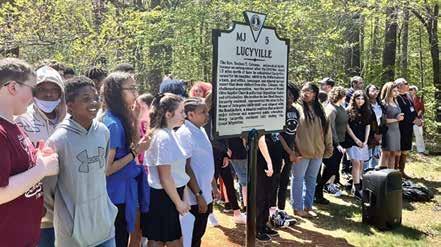
“
This is education in action,” said a smiling Ed Ayers, widely-known historian and former University of Richmond president, as he surveyed the Cumberland County crowd of more than 100 students and supporters. He was right: An amazing amount of student- and teacher-generated action made that culminating day in April happen, as Cumberland County Middle School history teacher Lewis Longenecker and his students celebrated the unveiling of a historic marker they’d initiated, and which now stands at a county intersection.
The marker preserves the memory and legacy of Lucyville, a Black community founded by freed slave Rev. Reuben T. Coleman, who named it after his daughter. Eventually, he owned a bank there and Lucyville also had its own newspaper and post office, along with a mineral springs resort.
“It’s incredibly important to understanding our communities that that we preserve their history,” says Longenecker, a Cumberland Education Association member, “and Virginia’s
ministration.
That’s why the National Education Association stepped in. Longenecker applied for and received an Envision Equity Grant from the NEA Foundation, which covered the expenses for students to research and produce a video entitled “The Chronicles of Lucyville: A Historic Community Forgotten.”
The day of the unveiling ceremony was festive, beginning with a gathering at the nearby Mount Olive Baptist Church, where speakers included descendants of Lucyville residents, Ayers, and Julie Langan, director of the Virginia Department of Historic Resources.
Pumping the Brakes
VEA saved thousands of school bus driver jobs during the General Assembly.
education and should be opposed… school districts should not enter into subcontracting agreements which transfer education employees or which abrogate previously contracted benefits, reduce compensation, deny benefits, and/or reduce or eliminate accumulating retirement experience and benefits.”
historic roadside markers have not always done that as well as they could, especially for underrepresented communities. The work our students have done has given them the chance to share accurately and proudly what makes overlooked parts of our story meaningful.”
The Lucyville marker wasn’t Longenecker and his students’ first rodeo—it’s the fourth of five they’ve worked on to research and earn state approval. Most were accomplished through the Virginia Department of Education’s Black History Month and Asian American Pacific Isalnder Heritage Month Historic Marker Competitions, annual events offering students an opportunity to preserve their communities’ local history. Unfortunately, those competitions were eliminated during the Youngkin ad-
After Longenecker noted that his students have another two dozen historic marker submissions in the pipeline, Langan lauded their ongoing efforts, which include digging deeply into primary sources and other historical documents, saying, “There’s no other school in the state that we’ve worked with so frequently on anything. Cumberland Middle School—you really stand out.”
Then it was on to the new marker’s site that ensures Lucyville will never be forgotten. “While the people of Lucyville chose to be exceptional, so did our students as they completed components of the marker application, collaboratively wrote articles relating to Lucyville, and helped plan the unveiling,” Longenecker says. “They really made a difference, and now there’s a permanent marker representative of more of Cumberland County and Virginia’s history.”l
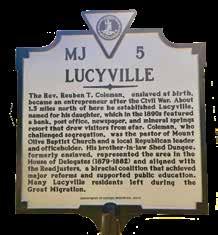
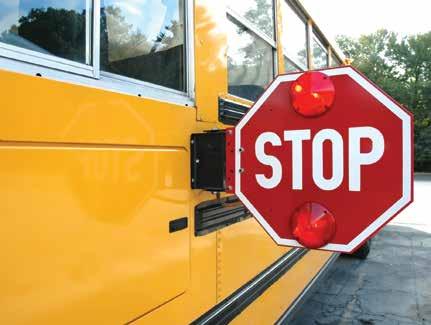
Something that escaped most of the public’s notice during this legislative session was a bill in both the House and Senate that would have allowed school divisions to “contract with a privately owned and operated entity…for the purpose of transporting pupils to and from school on a regularly scheduled basis.” In short, making it OK to privatize school bus services, putting thousands of public school employees out of work.
And it would have become law except for the intervention of VEA members and staff.
What’s more important than the safety of our young people, both at school and on the way back and forth?
According to the Virginia Department of
Education, almost a million children in the Commonwealth are transported every single school day to and from their classes, on field trips, or to athletic events and other school activities. They’re taken to those places in some 16,000 school buses.
Is this something we’d really be better off having handled by a for-profit company?
VEA members don’t think so.
In our organization’s belief statements, called Resolutions, which are written by members and approved by delegates to the annual convention, we clearly say, “subcontracting and privatization to evade hiring positions with benefits undermines and diminishes the quality of public
Resolutions aren’t just for the archives—they’re guiding principles that, when the situation calls for it, VEA members won’t hesitate to stand behind. This legislative session presented such a situation, as privatization supporters saw an opportunity, backed by the Youngkin administration, to put some public school services in the hands of private and profit-making entities.
“With more than a dozen pro-privatization organizations lining up to support these bills,” says VEA Policy Analyst Chad Stewart, “VEA stood against the tide and forced lawmakers to contemplate the consequences of such a move –jeopardizing worker well-being and student safety.”
Because of the intense lobbying of privatization backers, a version of the bill actually passed in the House, but VEA was instrumental in getting it killed in the Senate. It never reached the governor’s desk.
“It’s member support that allows VEA to be a dominant player in the General Assembly,” says Stewart. “With that kind of backing, we stopped hundreds of bills that could have diminished school resources, placing undue burdens on staff, and privatizing staffing positions. When it comes to support for our hardworking public school transportation professionals, VEA is the lone voice at the table during budget negotiations fighting for bus driver and other school support staff salaries.”l
Photos page 14 by Alyssa Hutton/Cardinal News, Photo page 15 by iStock VIRGINIA JOURNAL OF EDUCATION | JUNE 2024 15 FEATURE STORY 14 VIRGINIA JOURNAL OF EDUCATION | JUNE 2024
FEATURE STORY
Got Five Minutes?
One former middle-schooler, now a writer and journalist, says it can be enough to save a life.
By Xandra Harbet
Iwas 12 when I thought everyone had given up on me. Feeling like a burden to my family, my teachers, and even the mental health professionals I’d seen, I had given up on myself, too. Sixth grade marked the first time I’d wanted to die, and seventh grade marked the first time I tried to make it happen.
When you’re 12, six years feels like an eternity, so it’s hard to imagine making it to the finish line of a tumultuous adolescence.

Many suicidal kids don’t necessarily want to die, but hopelessness is a powerful stranglehold when you have little or no control over your circumstances. Back then, I leaned into my persona as the weird, angry kid to push people away before could get attached. I’ve since learned in therapy that it’s a common coping mechanism among those who feel rejected at home.
But there was one adult in my life who never gave up on me. One person who wasn’t scared off by my biting sarcasm, chaotic behavior, and tendency to shut down when I struggled with my schoolwork: my seventh grade math teacher, Mr. W.
Between coaching swimming and going for his doctorate, Mr. W was the busiest person I knew, but he refused to let me fall off the face of the Earth. Mr. W spent lunch periods painstakingly explaining each problem in my dreaded skill sheet assignment. The weekly worksheet consisted of problems unrelated to that year’s coursework, and my neurodivergent brain just couldn’t unravel what felt like riddles from the sphinxes that populated the fantasy worlds I used to escape reality. When he saw that this particular assignment led me to stop trying altogether, he decided to let me skip it, so long as I completed my daily
homework. Some teachers refuse to make allowances for kids who think differently. But Mr. W’s accommodations turned a dejected student into someone who made an effort. As a result, I was able to improve my grade.
Mr. W’s class was right before lunch, and I tend to tear up when I yawn, which was a common occurrence in math class. (Sorry, Mr. W.)
During these teary-eyed moments, Mr. W would always make sure I was OK, despite the 20 other students in the classroom. That small act of care meant a lot.
My two-week stint in the psychiatric ward, which followed my suicide attempt, felt more like a prison sen-
tence than a saving grace. The monotony of hours with only my thoughts and the yellowing walls to keep me company was excruciating. There was no music, TV, or any of the distractions that helped keep me afloat outside of these dirty walls. It was just about the worst thing you could do to a kid with my potent combination of ADHD and a mood disorder. Visits from Mr. W were the highlight of my time there, providing a dose of normalcy and lighthearted banter that allowed me to forget where I was for a little while.
I had plenty of teachers who cared about me in middle school and the years that followed. However, most of my relationships with adults — both in and beyond school — felt like obligatory transactions. But it was different with Mr. W. He wasn’t trying to turn me into someone wasn’t or even into an A-student in math. He just wanted to remind me that I mattered; importantly, he remembered to carve out the time and space to do that.
former math teacher told me, and I have never felt more understood.
Years on, I would occasionally visit his classroom on breaks from college, and without fail, he’d set aside five minutes for me. It’s been a while since I’ve made it back to my old middle school for a visit, but I still keep in touch with Mr. W.
Life is messy, and it’s easy to get swept up in the grind. Too often, children and teens feel dismissed by the busy adults in their lives, which can have real and devastating consequences.
Five Minutes for Yourself
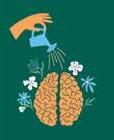
“But there was one adult in my life who never gave up on me.”
Every day, he offered me five minutes of undivided attention when I could vent, talk about my life, or recap in detail whatever TV show I was obsessing over that week. This continued the following year when he let me eat lunch in his classroom during his free period, even though he wasn’t even my teacher anymore.
When I was in high school, I went back to visit Mr. W weekly, and remember telling him about the gym teacher who asked how I could live with myself for not taking initiative during whatever tedious drills he was having us do. “He has no idea,” my
I know from experience that the inverse is true, too. Five minutes of recognition and kindness can be lifesaving for a young person who is struggling. If it weren’t for Mr. W, might not be here today. On some level, he knew that his time made a difference for me, but it wasn’t until I wrote him a letter inscribed on the author page of my first published short story that he realized he had helped save my life.l
Xandra Harbet (@XandraHarbet) is a journalist, essayist, and creative writer whose work has appeared in outlets including Salon, Insider, The Daily Dot, Regal, and StyleCaster. She has a BA in English with an emphasis on Creative Writing from Randolph College, and also student-taught and helped run an afterschool program in the Lynchburg area. This piece is reprinted with her permission and that of Chalkbeat (chalkbeat.org), where it first appeared.
Want to get better at managing your own stress, relieving your own anxiety, and just generally feeling happier? Here’s something you may want to try: As a VEA member, you now have access to Self Care+, a mental health resource available through NEA Member Benefits. It’s a self-guided therapy program built using research-based tool and skill-building tools from NEAMB’s new partner, AbleTo, which is a national provider of high-quality virtual mental health services (and recently merged with former NEAMB partner Sanvello).
You can use Self Care+ for free, along with the entire NEA Mental Health Program, thanks to funding from the NEA Members Insurance Trust. The revamped Mental Health Program launched this spring, is now available in all 50 states, and includes digital selfcare tools and activities including daily mood tracking, coping tools, meditations, and progress assessments.
Get an overview of what’s available in Self Care+, how it works, and how it can help you, along with answers to frequently asked questions, by visiting neamb.com/mentalhealth l
VIRGINIA JOURNAL OF EDUCATION | JUNE 2024 17 FEATURE STORY 16 VIRGINIA JOURNAL OF EDUCATION | JUNE 2024
Illustration page 17 by iStock
The author, graduating from Randolph College in Lynchburg.


On the Road Again
A
County teacher travels abroad with students after COVID.
By Hilary Falkenberg
I’ve had many opportunities to travel, both growing up and as an adult, and I believe you can learn some things when on the road that you might not ever learn otherwise. World travel is enlightening, and it’s exciting to imagine being somewhere new, exciting, and with lots of different cultural experiences. But, as they learn about other cultures in class, does the average student think this way? How do such students get opportunities to travel and see other parts of the world, especially
in the aftermath of an international pandemic? Family trips are always options, but not all families get these opportunities.
I want to get students excited about seeing different cultures, learning a new language, or just seeing amazing monuments and architecture that date back many years. I think of all the history, all the nostalgia, photo opportunities, and meeting new people from around the world—and I want to interest students in those kinds of opportuni-
ties, too. Because of modern technology and our growing ability to get to faraway places, bringing international travel back to my students at Gloucester High School has been a goal of mine since COVID’s dangers lessened.
This is a daunting challenge, as we work our way back into traveling. Fortunately, we are back on our feet again, but it takes someone to really get everyone on board again. Someone has to step up, make plans, and then get students and staff excited about it. I’m the cheerleader here, and it’s not always easy. There is always skepticism because of potential chaos overseas. Everyone wants to be safe, which is, of course, a primary concern.
It has always been my goal to ensure that students feel safe in my classroom, and want them to feel the same way about traveling. It’s a little more complicated on the road, however. To get started, I took a small group of GHS students to Costa Rica and Panama over spring break this year.
Having meetings prior to our trip was key because I could reassure students and families about safety and potential travel issues. During our trip, I was able to keep in touch via WhatsApp to communicate with family members back home. And we did have some, none that were major but a few that dealt with either getting sick or a minor injury. If a student did get sick or hurt, I had to be the “mama” on the trip and had no problem with that at all. As a mother of one daughter, it felt good to be the mom away from home for our traveling group of five girls. The families saw this and trusted me with their daughters, and we all got safely to Central America and then home safely. The entire experience was a
success, and I will do it again!
Most of the students along on the trip were either taking Spanish at the time or had taken it in the past, and it was an amazing opportunity for them to take their classroom learning into a real-world setting. Native speakers almost always love it when anyone tries to speak their language. The effort usually is appreciated, regardless of the skill level, and this is where the “real” learning of a language starts to happen, almost like an immersion, but on a smaller scale.
Getting on an airplane and traveling out of the United States was a first for a few of the girls. The first two nights in Guanacaste, Costa Rica were true eye-openers. Just going to an ATM and then exchanging currencies was an experience. Hiking at Rincón de la Vieja National Park was educational, both for the opportunities to explore all the beautiful hiking trails and see spider monkeys and unique-looking birds in their natural environment. We even got to see a sloth! The Arenal region was spectacular as well, with its tropical setting and beautiful flora and fauna. Of course, the major highlight was seeing the Lake Arenal Volcano. La Fortuna waterfall was a definite sight to see, too: 500 steps up, 500 steps
down. And our whitewater rafting experience on the Sarapaquí River was just amazing and one of my favorite adventures while in Costa Rica. Then we were on to Panamá, where seeing the Panama Canal was definitely my favorite; one the seven wonders of the modern world! We also traveled with other schools from the U.S., which gave each group a chance to meet and connect by sharing similar interests. What a trip! I thank EF (Educational First) for giving us this opportunity.
Bringing travel into the equation while learning a second language really gets students excited to put their hand to paper, memorize key vocabulary, or even conjugate verbs, because they know that on such a trip, their hard work will pay off. Plans are in the works to take another group of GHS students to Spain and France in 2025. So off to globetrotting we go: Another trip to get excited about, another grammar lesson in Spanish or French, and another opportunity to travel and see the world!l
Hilary Falkenberg, a member of the Gloucester Education Association, teaches World Languages at Gloucester High School.

18 VIRGINIA JOURNAL OF EDUCATION | JUNE 2024
JOURNAL OF EDUCATION | JUNE 2024 19 FEATURE STORY
VIRGINIA
Gloucester
The author, at the Panama Canal.
Bauer, Jones, Hickerson Elected to Leadership Posts at VEA Convention
Delegates to VEA’s 2024 convention in Hampton chose the union’s next leadership team, electing Carol Bauer of York County as president, Dr. Jessica Jones of Pittsylvania County as vice president, and Kevin Hickerson of Fairfax County as one of Virginia’s representatives on the NEA Board of Directors. Bauer and Jones will begin two-year terms August 1; Hickerson will begin a three-year term September 1.
Bauer, an elementary school teacher, has been VEA’s vice president for the last four years; Jones, a high school agricultural education teacher, has served as the president of the Pittsylvania Education Association for 10 years; and Hickerson, a high school special ed teacher, is the former president of the Fairfax Education Association. All three have also held other VEA leadership positions.
During the convention, the VEA Fund for Children and Public Education recommended several early endorsements in Congressional elections to the NEA Fund, which officially backs candidates in federal elections. Those early endorsements include Bobby Scott, Jennifer McClellan, Don Beyer, and Gerry Connelly for re-election to the U.S. House of Representatives and Tim Kaine for another term in the U.S. Senate.
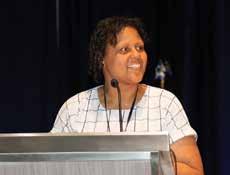


After sometimes-vigorous debate, the approximately 400 delegates passed a wide range of new business items that included calling on members and staff to work with state legislators and policymakers toward these goals:
• A statewide health insurance plan option for public school employees.
• Allowing all pay, including overtime and stipends, to be used in calculating retirement benefits.
• Allowing partial credit when students select some correct answers on multiple answer questions on the SOL assessments and the Virginia Growth Assessments.
• Safe and healthy indoor air quality in school buildings.
• An ESP Bill of Rights modeled on the NEA ESP Bill of Rights.
• Permitting all education employees to move to VRS Plan 1.
• Repealing the public sector ban on strikes and work stoppages.
Delegates also heard annual reports from the Legislative Committee, detailing the strides that were made for public education during the 2024 General Assembly; and the Fitz Turner Commission, describing VEA member work on making much-needed progress in the fight for equity and justice. In addition, VEA members in Hampton raised over $73,000 for the VEA Fund to help support friends of public education in future elections.l
The March to the Bargaining Table Continues
VEA locals around the state continue to move ahead on making collective bargaining for public school employees the norm in their communities. Some recent developments:


• Members in Stafford County and city of Roanoke have publicly announced their intentions of establishing contract negotiations in their school divisions and have launched card campaigns. The Newport News Education Association is looking to wrap up its card campaign by the end of the school year.
• Education Association of Alexandria members, after sustained efforts to improve an earlier version, succeeded in getting an equitable bargaining resolution adopted by their city’s school board. EAA’s next step will be to submit signed cards to prepare for a representation election. Members of the Albemarle Education Association have reached the same stage, also following difficult negotiations with the county’s school board to improve an earlier negotiations resolution. In Petersburg and Harrisonburg, members continue to fight for fair resolutions.
• The Williamsburg-James City Education Association will submit their signed cards to the school board to encourage it to pass a bargaining resolution.
• The Montgomery County Education Association will be holding an election to gain the right to represent support staff employees.
• The Charlottesville Education Association won its election to represent the city’s support staff school employees and is going to the table to begin bargaining for certified staff.l
I’m So Proud of Our Union

PRESIDENT’S MESSAGE
I’d like to begin with a heartfelt thank you. It has been an honor serving as VEA President for the past four years. Serving our union and giving voice to the best educators in the nation has been the privilege of a lifetime. I am very proud of all that we’ve accomplished during my tenure. Together we helped lead the Commonwealth through COVID, removed barriers, empowered one another, and forged partnerships both within and outside of our union.
Just a couple months ago, we held our annual Delegate Assembly in Hampton, and the theme of our gathering was Building Bridges. In my time as president, I have dedicated myself to doing that. As the VEA moves forward
with new leadership, my strongest hope is for our unity. It’s only with the help of one another that our union grows, our voices become louder, and the dreams we have for our students and educators become reality.
As I move on to my next chapter, it’s also my hope that we’ll continue to make our Building Bridges convention theme a reality. Let’s go on finding and strengthening our common ground with other organizations, with local and state leadership, and then throughout the Commonwealth. Only a united front, built upon a foundation of hope, community, and empowerment, will make it possible to achieve the important goals we’ve set for public education.
It’s hard for me to put into words just how deep my gratitude is for each and every one of you. It’s been an honor and a privilege to lead such a remarkable group of professionals, and I am profoundly grateful for the opportunity to have served alongside you. Every step we’ve taken is a testament to the dedication, talent, and resilience of every member of this extraordinary union.l
VIRGINIA JOURNAL OF EDUCATION JUNE 2024 21 MEMBERSHIP MATTERS 20 VIRGINIA JOURNAL OF EDUCATION | JUNE 2024 Photos page 20 Lisa Sale
VEA’s President-elect Carol Bauer (clockwise from top), NEA Director-elect Kevin Hickerson, and Vice President-elect Jessica Jones.
UPDATE
VEA Welcomes New Staff

Jeremiah Hoyt has joined VEA as an Organizer in Northern Virginia and brings experience with the SEIU, in addition to serving as a reading interventionalist in Henrico County and as a legislative intern in both the US House of Representatives and the US Senate.

Annie Stetz is an organizer based in Richmond but working across Virginia as needed. A recent graduate from Cornell University’s School of Industrial and Labor Relations, she has interned at both the Pennsylvania State Education Association and the NEA.

Raven Wilkerson is the a UniServ Director working with the Fairfax Education Association. She’s not new to VEA, however, having worked as a VEA organizing and affiliate support staffer for more than 16 years before leaving in 2018. She came back to FEA in a temporary role last September and has now transitioned into a permanent role.

Michele Wickman is VEA’s new Membership Records Supervisor
A former member of the Stafford Education Association, she served as a librarian at North Stafford High School since 2016, following her tenure as a middle school math teacher. Michele also served as SEA’s data consultant and as a member organizer.l
Boost Your Money Skills With myVRS Financial Wellness
As a member of the Virginia Retirement System, you have access to myVRS Financial Wellness, a personalized planning resource. Visit varetire.org/financial-wellness for an overview of the program and then log in to myVRS for videos, articles and self-paced courses that will boost your financial confidence. Also, once into myVRS, you can also navigate to Financial Wellness and use the search box to find the following resources.
Build Your Budget. Tracking your income and expenses can help you maximize your money and achieve savings goals, whether it’s a vacation, a child’s tuition or retirement savings. Start with the Creating a Budget (and Sticking to It) course for practical insights. For example, have you analyzed your periodic, variable and fixed expenses to find ways to save? (Hint: Think groceries, online subscriptions and dining out.) Use the Budget tool for easy tracking. Be honest about your spending and set realistic expectations. Save your budget and update it when your expenses or income change, or when you’re ready to set a new savings goal.
Commit to Saving. Saving for major milestones doesn’t have to be overwhelming. As a first step, take stock of your current debt and spending patterns. Then, check out courses in myVRS Financial Wellness on repaying student loans, managing credit cards and avoiding debt in the future. Use the Saving for a Goal Calculator to assess long-term targets like home ownership, an advanced degree, travel and retirement. Take the course on Saving for Goals to evaluate ways to increase your savings through incremental steps over the next year and beyond.
Prepare for the Unexpected. Many experts recommend having an emergency fund equal to at least three to six months of living expenses. Calculate your basic monthly expenses and review your budget to see what you can put toward emergency savings on a regular basis. Use the Emergency Fund tool to project your savings goal over the next year and estimate how long your fund will last. It includes additional planning tips to help you weather the unexpected.l


MEMBERSHIP MATTERS 22 VIRGINIA JOURNAL OF EDUCATION | JUNE 2024
Four Character-Based Ways to Boost Kids’ Mental Health
We’ve got a mental health crisis among our school-age population and, according to Character.org, much of the blame for it comes from four different sources: the negative influences of social media and smartphones; “gloom and doom” narratives, which can lead to a growing pessimism; the tremendous pressure to achieve academically; and parenting styles, including the tendency to overprotect children.
But, Character.org’s staff and advisory council say, we can fight this crisis by emphasizing four character-based solutions: Reinforce the Importance of Hope and Purpose Research has demonstrated the significant benefits that emerge when teens have purpose.

• Introduce the language of purpose, so teens understand why it is important for them to develop a future-minded mindset.
• Encourage young people to “find their purpose” based on their interests and character strengths, emphasizing that one’s purpose differs from choosing a career.
• Provide opportunities for every teen to explain in their own words how they are in control of their own future (captain of their ship).
Ensure that Every Young Person Has At Least One Meaningful and Supportive Relationship with a Caring Adult
Research shows the benefits of when young people have a caring adult in their lives.
• Introduce the language of positive relationships, so teens understand why it is important to build a meaningful relationship with a caring adult.
• Provide opportunities for every teen to explain in their own words how a caring adult is helping them become their best possible self.
Emphasize the Practice of Gratitude Research shows that gratitude doesn’t just feel good, gratitude is good for you.
• Explain why daily gratitude affirmations improve health and lower stress and anxiety.
• Encourage young people to notice and appreciate the good things in their lives.
• Provide opportunities for young people to explain their gratitude practice, whether it’s writing in a “gratitude journal” or a specific ritual of gratitude.
Teach and Model the Skills of Positive Self-Talk Recent research has shown the benefits of positive self-talk.
• Explain to young people that everyone has that “voice” in their heads constantly telling them that no one likes them or that they can’t do anything right.
• Demonstrate the steps young people can take to select a positive expression to refute their negative self-talk.
• Provide opportunities for young people to share with others the positive expression they repeat to themselves and why this word or phrase has personal meaning to them.l
Is Your School a Place of Trust?
“Trust is the glue of life,” said Stephen R. Covey, author of the bestselling The 7 Habits of Highly Effective People. “It’s the most essential ingredient in effective communication. It’s the foundational principle that holds all relationships.” Turns out that it’s also the determining factor in the success of organizations, including schools. Here’s some of the research:

• A 2023 study by research firm i4cp showed that two-way trust within an organization was the biggest difference between groups that were highperforming and those that were low-performing. In organizations that perform at a high level, employees were more than 10 times more likely to say they trust senior leadership and senior leaders were 11 times more likely to say they trust their employees.
• Another 2023 study, conducted by Slack, found that trust was the top factor in employee productivity, outscoring even flexibility. In fact, employees who felt trusted were twice as productive as those who didn’t; they were also 30 percent more likely to put in extra effort. Not only that, they also felt more than 4 times the sense of belonging and overall satisfaction than employees who didn’t feel trusted.
• What creates trust? In the Slack study, transparent communication was the top factor.l

It’s a Privilege

“No one gets to do what we do. No one gets to turn up and have the opportunity to make the difference in someone’s most prized possession. They give us their very best, their child. We get to serve that person; we get to be the opportunity, the hope.”l
Hamish Brewer, known to many as the Relentless, Tattooed Skateboarding Principal, a former Virginia Principal of the Year and National Association of Elementary School Principals Nationally Distinguished Principal
Our Changing Student Population

In the fall of 2010, 9.2 percent of America’s public school students were English Learners (ELs). In the fall of 2020, that percentage hit 10.3, which translates to 5 million young people who aren’t native English speakers. The figures from 2020 also show that the percentage of public school students who were ELs ranged across states from a low of 0.7 percent in West Virginia to 20.1 percent in Texas. Virginia registered 9.6 percent.l
Source: National Center for Education Statistics
OF EDUCATION | JUNE 2024 25 Photos and photo-illustration by iStock 24 VIRGINIA JOURNAL OF EDUCATION | JUNE 2024 INSIGHT ON INSTRUCTION
VIRGINIA JOURNAL
‘We’re
Not Going to Ban Our Way to Healthier Discourse’

Several states passed legislation or issued administrative rules barring or limiting teaching of certain “controversial” topics, including elements of American history, racism and gender discrimination…We are not going to ban our way to better civics and history education in America. We are not going to ban our way to healthier discourse, either. To improve the tone of political discourse, give young people tools to do better. Civics and history classrooms offer an ideal setting for students to engage in productive, respectful conversations about current events, government and our past. When civics and history are taught well, students develop civil discourse, critical thinking and citizenship skills that strengthen communities.l
— David J. Bobb, president and CEO, Bill of Rights Institute
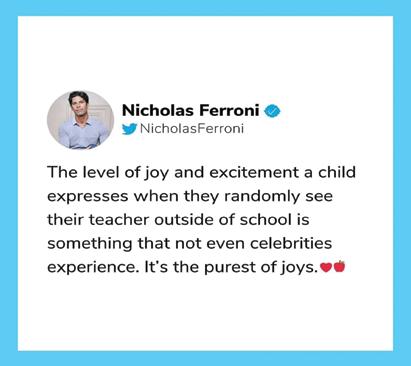
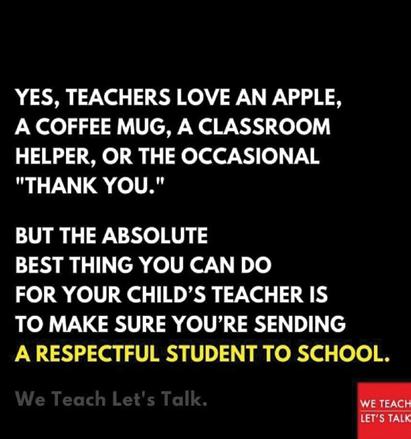
VEA Members Saluted for Excellence Statewide
Three VEA members are among Virginia’s 2025 Regional Teachers of the Year and therefore finalists for the statewide honor. A special salute to:

• Candace Carrier of the Montgomery County Education Association, a career and technical education –agricultural education teacher at Blacksburg High School. She’s been a teacher and a mentor for 20 years.
• Darnell Greene of the Manassas Park Education Association, an eighth-grade math teacher at Manassas Park Middle School. He’s served as a teacher, mentor, and coach for more than 21 years.
• Beth Marshall of the Spotsylvania Education Association, a French teacher at Riverbend High School. She’s been a teacher and a mentor for 27 years, the last 11 at Riverbend.
In addition, school divisions have varying calendars for naming their Teachers of the Year, so this list is nowhere near complete, but here are some VEA members who are already their division’s current TOTY:
• Catherine Gray of the Charlottesville Education Association and Clark Elementary School.
• Cynthia Hayes of the Mathews County Education Association and Mathews High School.
• Amy Klontzaris of the King & Queen Education Association and Lawson-Marriott Elementary School.
• Amber Pilson of the Patrick County Education Association and Woolwine Elementary School.
• Holly Ransone of the Westmoreland Education Association and Westmoreland High School.
• Regina Williams of the Brunswick Education Association and Brunswick High School.l
Physical Fitness Improves Children’s Mental Health: Study

Using a decade’s worth of data, a study done in Taiwan has found that children and adolescents with higher rates of physical activity have lower rates of mental health disorders. Researchers examined information on 10- and 11-year-old students over a period of at least three years and compared their physical fitness results in school tests to mental health diagnoses, such as ADHD and anxiety and depressive disorders.
Better scores in cardiovascular fitness, muscular endurance, and muscular power were linked to decreased risks of mental health problems. The tests given to students to measure each of those three categories were an 800-meter run for cardio fitness, sit-ups for muscular endurance, and the standing broad jump for muscular power.
The study, published in the Journal of the American Medical Association Pediatrics, adds credence to the belief long held by many scientists that exercise and mental health are strongly linked.l
26 VIRGINIA JOURNAL OF EDUCATION | JUNE 2024 INSIGHT ON INSTRUCTION
Photos and photo-illustrations by iStock VIRGINIA JOURNAL OF EDUCATION | JUNE 2024 27

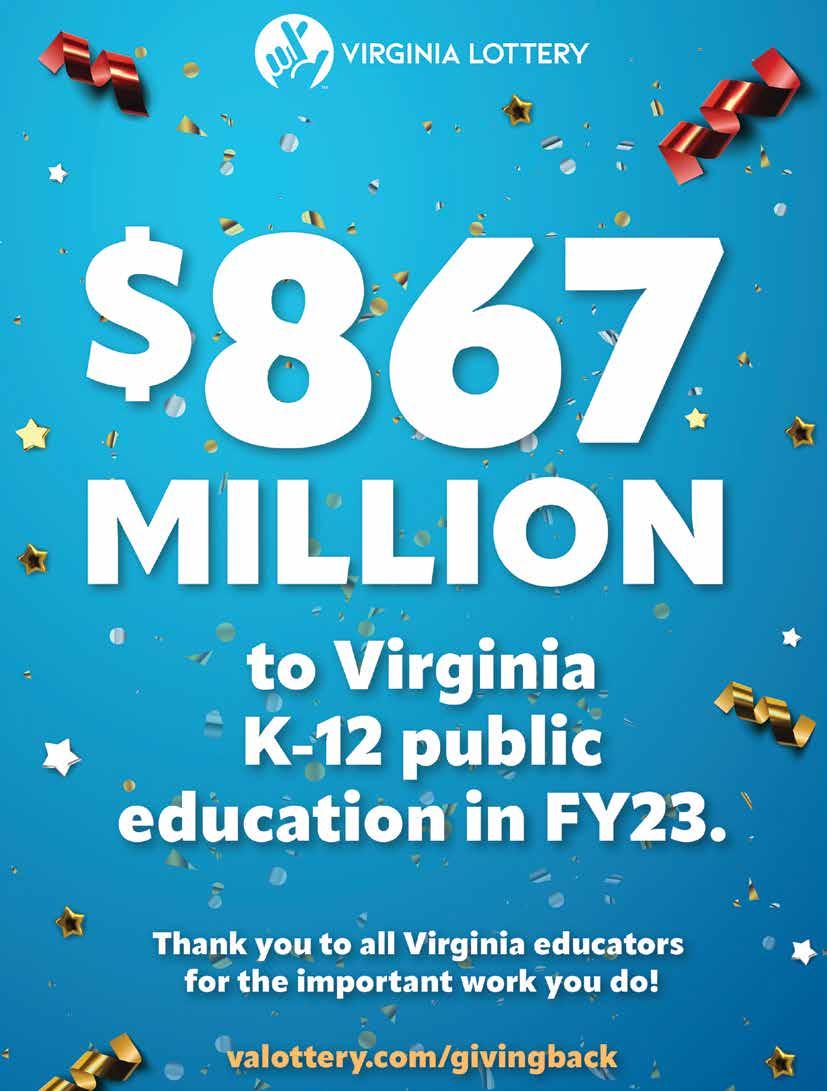

After 50 Years, Words
to
Live By
Fifty years ago this spring, student-taught at Glenvar High School in Roanoke County. A half century later, I’m wrapping up the school year at Lord Botetourt High School, where I’ve taught for 35 years. Here are some of the principles I’ve come to believe in.
Confess Your Mistakes to Students
No matter how skilled in our subject or how refined in our classroom presentations, there will be days and times when we don’t satisfactorily explain a concept to the vast majority of our students, resulting in blank looks and confused expressions.
The most difficult concept I have to teach every semester to my 10th-grade students is how to write an analytical paper, including the counter argument. Earlier this semester, the first day I tried to explain the intricacies of this type of assignment, I once again failed.
After a frustrating and mostly sleepless night, I decided to begin the next day by apologizing to my young people for a poorly designed lesson plan. Then I said, “All you have to remember about the counter argument is to write down what the opposite point of view is, then kill it.” Immediately, the students grasped the concept, as their papers later proved. I also sincerely believe that students will respect the teacher who admits his or her errors instead of glossing over them.
Always Say Something Positive about a Child to a Parent
Every year we’ll have several students with various issues concerning behavior and/or learning. And after agonizing for several or many days, we’ll come to the conclusion that the dreaded “call Momma” game plan has to be initiated.
I know that sometimes Little Johnny or Susie truly may not seem to have any redeeming characteristics, but find one anyway and begin that phone call praising some aspect of that young person. Remember that the moment we call and tell the parent who we are, that individual will automatically assume that this event can’t be a good thing…and that parent will have guessed correctly.
But by beginning with a young person’s positives, we will communicate that we at least have taken the time to notice that the child has good attributes and virtues that can be amplified and admired.
Try to Never Take Work and Problems Home
As important as our students are to us, we must never try to become so involved with our school families that we neglect our own. I’ve been guilty of this, as probably have most teachers. For example, one of the most piercing things that my daughter, Sarah, has ever said was that I never had time for her anymore. When a 10-year-old can vocalize her frustrations with a parent, we had better listen. I promised Sarah that I would try to do better, and I feel and hope that did.
I strongly believe that the best way to be a better parent as a teacher is to try to never take our school work and problems home with us. For example, if I have numerous papers to grade and/or grades to record, I will stay later at school that day or make plans to come early the next morning. That way when I do arrive home, I can concentrate on being a good husband and dad instead of squirreling myself away somewhere and slogging and stewing through papers.
The same philosophy holds true with school problems that we may be experiencing. know it’s hard, but it’s better that we leave these issues at the schoolhouse door instead of dumping them on our spouses and kids.
Never Say Negative Things about Fellow Teachers strongly believe that we should never utter negative remarks about our fellow professionals. No matter what that teacher down the hall’s flaws are, it’s not for us to point them out or correct them. I’ve never criticized other teachers or complained about them to an administrator or a fellow teacher. Goodness knows I have enough failings that could be discussed in detail if someone chose to. hope I can continue to learn to be a better teacher in the time I have left in the classroom.l


30 VIRGINIA JOURNAL OF EDUCATION | JUNE 2024 FIRST PERSON: NARRATIVES FROM THE CLASSROOM
Bruce Ingram (bruceingramoutdoors@gmail.com), a member of the Botetourt Education Association and a veteran educator, teaches English and Creative Writing at Lord Botetourt High School. He’s also the author of more than 2,700 magazine article and 11 books.
— Bruce Ingram
Photo by iStock




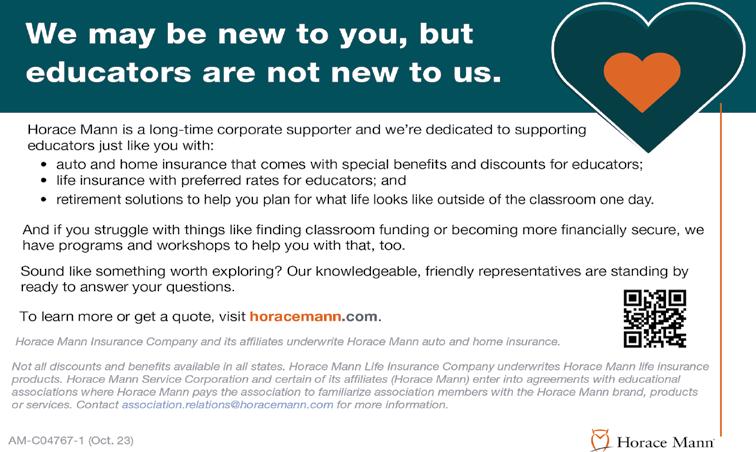
A publication of the Virginia Education Association 8001 Franklin Farms Drive, Suite 200, Richmond VA 23229 veanea.org vea4Kids
























































































